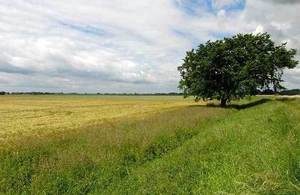UK Government to protect international heritage from disasters and conflict
- The fund has traditionally supported conservation of internationally important cultural heritage sites threatened by conflict
- 2020 will see a new focus on protecting international heritage from natural disasters and climate change
UK Heritage Minister Helen Whately has announced a further £10 million for the UK’s work to protect overseas cultural heritage.
The investment builds on the £30 million ploughed into the Cultural Protection Fund since it was established in 2016. It provides funding to safeguard heritage of international importance threatened by conflict in countries across the Middle East and North Africa.
The Fund will now be extended to help heritage sites overseas to prepare for and respond to the potential risk of natural disasters and climate change. A new pilot will be trialled, providing local organisations with the skills to protect ancient sites and cultural heritage.
The new focus has been prompted by the tragic loss of iconic buildings and collections in Brazil following the fire at the Museu Nacional in 2018 where more than 20 million objects are thought to have been lost.
The new funding will also support existing Cultural Protection Fund projects to enhance the long-term sustainability of their work and new funding is available for organisations working on projects in Syria, Libya and Yemen.
Heritage Minister Helen Whately said:
The UK’s Cultural Protection Fund helps to protect sites and objects of local and international cultural importance across the world.
In recent years we have seen some of the world’s great cultural treasures destroyed by conflict or natural disasters. These are losses for the whole of humanity.
This additional funding will help communities around the world preserve art, culture and heritage of global significance.
More than 50 grants have been awarded since 2016 to projects working across 12 countries in the Middle East and North Africa.
It is estimated that by 2020 more than 3,000 people will have developed new skills in heritage protection thanks to the Cultural Protection Fund. So far, 10,000 people have taken part in activities to increase understanding of and engagement with their cultural heritage.
Current projects include:
- Working with the Yazidi people in displacement camps in Iraq to record and share their music and cultural heritage
- Preserving unique archaeological sites in Iraqi Kurdistan that date to 10,000 years old that were damaged by the Saddam Hussein regime
- Working with Syrian refugees to give them the skills to rebuild their country’s stone-built heritage
- Collecting linguistic data to develop a multilingual dictionary to help preserve the endangered Pamiri languages in Afghanistan
- Creating a database of Egyptian and Nubian artefacts in a bid to counteract looting and illegal trafficking of antiquities in Egypt
Notes to editors
- The new £2 million Disaster and Climate Change Mitigation Fund pilot will be managed by the Department for Digital, Culture, Media and Sport and will focus on ODA-eligible countries.
- The British Council will receive £8 million to build on the long term sustainability and impact of existing Cultural Protection Fund projects in 12 locations and to support projects working in Syria, Libya and Yemen.
- The Cultural Protection Fund is managed by the British Council – the UK’s international organisation for educational opportunities and cultural relations – in partnership with the Department for Digital, Culture, Media and Sport (DCMS).
- About UK aid: The UK government uses aid to tackle the global challenges of our time including poverty and disease, mass migration, insecurity and conflict to make the world – and ultimately the UK – a better, safer and more prosperous place.

